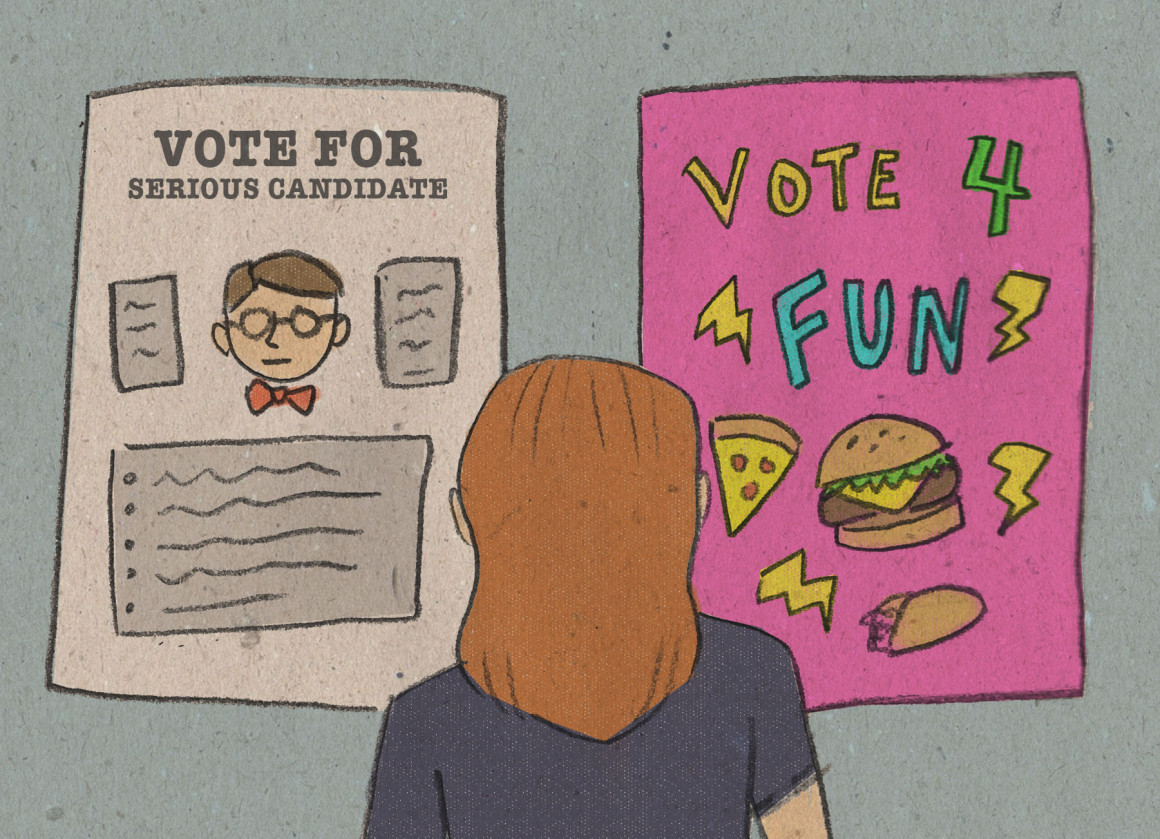
Students’ Union elections need better posters and real debates
Students’ Union elections mean poster-covered hallways and candidates begging for votes with in-class speeches. And while University of Calgary SU elections are generally well-run and boast comparatively high voter turnout, there are still ways to improve them.
The most visible part of the campaign is the thousands of posters littering campus. These posters inform students who is running for each position, but that’s often their only purpose. Platform points are a rarity on posters. Instead, candidates’ gimmicky campaign themes feature prominently.
Costumes and gimmicks are inevitable and can help generate interest in the election. But the SU should take steps to minimize the chance of students simply voting for the candidate with the best theme.
Some people will diligently read platform pitches on the SU website, but let’s not kid ourselves — most students have little interest in student politics. However, that doesn’t mean they don’t care about how the SU is run, and it should be as easy as possible for these students to read candidates’ platforms.
One policy that would help accomplish this goal is requiring posters to include at least some information about a candidate’s platform. It would provide a simple way for all students to familiarize themselves with the platforms, and could even lead to candidates spending a little less time on their slogans and jokes and a little more time on the issues.
But it’s not enough to just have rules in place — they also need to be enforced. Opposing candidates and their cronies would no doubt keep a sharp eye out for violations. These could then be reported to the chief returning officers — who would take down the poster and reprimand the campaign putting them up. This is already the policy for existing poster violations, so enforcing new rules for posters would be fairly easy.
Candidate forums are another campaign fixture. The hour-long question and answer periods for each position draw literally tens of students to MacHall’s north courtyard. The forums offer an opportunity for candidates to go through their platform, but tough questions are rare and a candidate critiquing a competitor’s ideas is unheard of.
This is primarily because each candidate gets a chance to answer every question and debate between candidates is not allowed. Why candidates are coddled in this way is unclear. We expect SU executives to negotiate with university administrators and convince government officials their student ideas are worth listening to. Asking candidates to defend their ideas on a public stage is one way of finding out how prepared they are for this part of their jobs.
Forums don’t need to be turned into all-out debates, but more lively discussion would be a good thing. Bad and unfeasible ideas need to be identified as such, and this won’t happen unless candidates are free to confront each other.
Some might argue that more confrontational forums would be another hurdle to students running, but the commitment required to run in the election is already so high that it seems unlikely this addition would dissuade many students. And if students hope to run without having their ideas scrutinized, then perhaps they should reconsider their plans.
The SU should constantly be looking at ways to improve their elections. New rules for posters and forums where candidates actually get a chance to challenge each other’s ideas are two ways to do just that.
Fabian Mayer, Gauntlet Editorial Board
